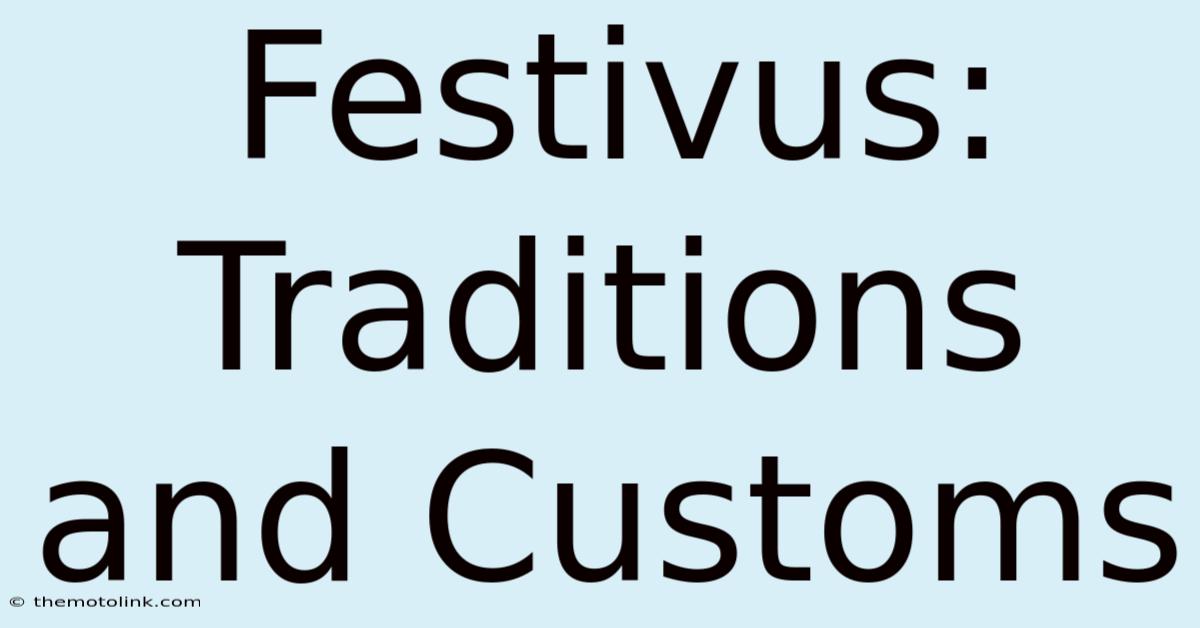Festivus: Traditions And Customs

Discover more detailed and exciting information on our website. Click the link below to start your adventure: Visit Best Website nimila.me. Don't miss out!
Table of Contents
Festivus: Traditions and Customs of a Modern Holiday
Did you know that millions of Americans secretly celebrate a holiday born not in a manger, but in a sitcom? Festivus, the fictional holiday popularized by the television show Seinfeld, has gained a surprising level of real-world popularity. This article delves into the traditions and customs of this increasingly celebrated alternative to traditional Christmas and Hanukkah.
The Backstory: From TV Gag to Cultural Phenomenon
Festivus, first introduced in the Seinfeld episode "The Strike," is the brainchild of Frank Costanza, the notoriously eccentric father of George Costanza. While initially intended as a comedic device, Festivus's unique blend of irreverence and heartfelt family focus struck a chord with viewers. Its anti-consumerist message and emphasis on airing grievances resonated with many who felt overwhelmed by the commercialization of the holiday season. Over the years, Festivus has evolved from a TV joke to a genuine, albeit niche, holiday celebration, with dedicated fans organizing gatherings and embracing its unconventional traditions.
Key Insights: The Core Principles of Festivus
At its heart, Festivus is a holiday about family and honest self-reflection. It eschews the materialistic excesses often associated with Christmas and instead promotes a more intimate, less commercialized approach to celebrating the season. This rejection of consumerism is a central theme, evident in the iconic Festivus pole – a simple, unadorned aluminum pole, replacing the traditional decorated Christmas tree. This symbolizes a stripping away of the unnecessary embellishments of modern life, focusing on the core values of family and togetherness. The absence of tinsel and ornaments is a deliberate statement against excessive materialism.
The Festivus Festivities: Traditions and Customs
Several key traditions define the Festivus celebration. These include:
- The Festivus Pole: The centerpiece of the celebration, a bare aluminum pole, representing the holiday's rejection of commercialism.
- The Airing of Grievances: This is perhaps the most well-known Festivus tradition. Family members take turns verbally expressing their frustrations and complaints about one another throughout the year. It's a surprisingly cathartic experience for many participants, offering a structured way to address long-simmering resentments. Remember to keep it respectful and focused on constructive feedback.
- The Feats of Strength: The head of the household challenges a family member (often the strongest) to a wrestling match. Only when the head of the household is pinned is the Festivus celebration officially considered complete. This tradition underscores the importance of physical and mental strength within the family unit.
Expert Opinions and Trends: The Growing Appeal of Festivus
The rise of Festivus reflects a broader cultural shift towards alternative holiday celebrations. Sociologists point to a growing dissatisfaction with the commercialization of traditional holidays, driving people to seek more meaningful and authentic ways to connect with loved ones. The holiday's embrace of honesty and self-reflection also aligns with contemporary trends toward greater transparency and mental well-being. "Festivus taps into a desire for simpler, more meaningful celebrations," says Dr. Sarah Miller, a cultural anthropologist at the University of California, Berkeley. "It’s a rebellion against consumerism and a call for genuine connection."
Future Implications: The Enduring Legacy of Festivus
Festivus's future looks bright. As more people become disillusioned with the commercial pressures of the traditional holiday season, the appeal of this unconventional celebration is likely to increase. Its unique blend of irreverence and heartfelt family focus continues to resonate with a growing segment of the population. While it's unlikely to replace Christmas or Hanukkah entirely, Festivus provides a valuable alternative for those seeking a less commercialized, more authentic approach to the holiday season.
Conclusion:
Festivus, born from a Seinfeld episode, has blossomed into a surprisingly popular alternative holiday. Its focus on family, honesty, and a rejection of consumerism makes it a unique and appealing option for those seeking a different kind of holiday experience. What are your thoughts on Festivus? Could this unconventional holiday become a more mainstream celebration in the years to come? Share your opinions in the comments below!
Suggested Images:
- A picture of the Festivus pole.
- A family engaged in the "Airing of Grievances."
- An infographic outlining the key traditions of Festivus.
FAQs (with Schema Markup suggestions):
- Q: What is Festivus? (Schema:
{"@type": "FAQPage", "mainEntity": [{"@type": "Question", "name": "What is Festivus?", "acceptedAnswer": {"@type": "Answer", "text": "Festivus is a secular holiday created in the Seinfeld TV series, characterized by its rejection of consumerism and emphasis on family togetherness."}}]}) - Q: When is Festivus celebrated? (Schema: Similar to above, answer with the date – December 23rd)
- Q: What are the main traditions of Festivus? (Schema: Similar to above, list the three main traditions)
Meta Title: Festivus Traditions & Customs: A Guide to the Unconventional Holiday
Meta Description: Discover the unique traditions and customs of Festivus, the anti-consumerist holiday from Seinfeld. Learn about the Festivus pole, the airing of grievances, and the feats of strength. Celebrate a meaningful holiday season!

Thank you for visiting our website wich cover about Festivus: Traditions And Customs. We hope the information provided has been useful to you. Feel free to contact us if you have any questions or need further assistance. See you next time and dont miss to bookmark.
Featured Posts
-
Magic Vs Celtics Game Preview
Dec 24, 2024
-
Bill Clinton Hospitalized Fever
Dec 24, 2024
-
2026 Honda And Nissan To Merge
Dec 24, 2024
-
Clinton In Hospital Fever Reported
Dec 24, 2024
-
Green Bay Dominates New Orleans
Dec 24, 2024
